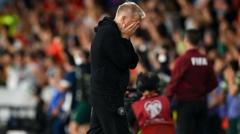The Republic of Ireland’s recent match against Portugal ended in a narrow 1-0 defeat, leaving fans and players alike grappling with a mixture of disappointment and frustration. Despite the loss, the team’s coach, Heimir Hallgrimsson, emphasized that his players delivered a commendable performance throughout the match. The late goal by Portugal, which sealed Ireland’s fate, has sparked discussions about the team’s resilience and ability to maintain focus under pressure. This defeat raises critical questions about the team’s strategy moving forward and their potential for improvement in future competitions.
As the team reflects on this match, the implications extend beyond just the scoreline. Hallgrimsson’s remarks highlight the emotional toll such a loss can take on a squad that has shown significant promise. With upcoming fixtures on the horizon, the challenge will be to harness the lessons learned from this painful defeat while maintaining morale and motivation. The question remains: how will the Republic of Ireland respond to this setback, and what strategies will they employ to ensure a more favorable outcome in their next match?
Analyzing the Match Performance
The Republic of Ireland showcased a solid performance against Portugal, demonstrating tactical discipline and a cohesive team effort. Hallgrimsson noted that the players executed their game plan effectively, maintaining possession and creating opportunities. The defensive unit displayed resilience, successfully neutralizing several of Portugal’s attacking threats for most of the match. This performance, while ultimately resulting in a loss, reflects the potential within the squad to compete at a high level.
Statistically, Ireland held a respectable percentage of possession and created several chances, indicating a balanced approach to both defense and attack. Despite facing a formidable opponent, the team managed to keep the scoreline close, which is a testament to their organizational skills on the pitch. The late goal, however, underscored the critical nature of maintaining concentration until the final whistle, a lesson that Hallgrimsson emphasized in his post-match analysis.
Looking ahead, the focus for Ireland will be on refining their strategies to convert strong performances into positive results. The ability to learn from this match and address any weaknesses will be crucial for the team’s development. As they prepare for future encounters, the emphasis will be on building mental resilience and ensuring that they can withstand late-game pressures effectively.
The Impact of Late Goals
Late goals have a profound psychological impact on teams, often leading to feelings of despair and frustration. For the Republic of Ireland, conceding a goal in the dying moments of the match against Portugal was particularly disheartening. Hallgrimsson described the experience as “painful,” highlighting the emotional toll such scenarios can take on players. This moment not only affected the outcome of the match but could also influence the team’s confidence moving forward.
Statistically, late goals can shift the momentum of a match, often leading to a loss of morale for the conceding team. In this case, Ireland’s players had to cope with the sudden shift from a potential draw to defeat, which can be challenging for any squad. The psychological effects of such moments can linger, making it essential for the coaching staff to address these issues in training sessions.
To mitigate the impact of late goals in future matches, Ireland will need to focus on enhancing their game management skills. This includes maintaining composure during critical moments and ensuring that players remain focused on their roles until the final whistle. By addressing these psychological aspects, the team can build resilience and improve their ability to handle pressure in high-stakes situations.
Future Prospects for the Republic of Ireland
The Republic of Ireland’s future hinges on their ability to learn from recent experiences and adapt their strategies accordingly. With Hallgrimsson at the helm, there is a sense of optimism surrounding the team’s potential for growth. The coach’s emphasis on a “great team performance” suggests that the foundation is there, but the challenge will be to build on this momentum and translate it into tangible results.
As the team prepares for upcoming fixtures, the focus will be on refining their tactical approach and enhancing their attacking capabilities. This may involve experimenting with different formations and player combinations to find the most effective strategies. Additionally, fostering a strong team spirit will be critical as they navigate the challenges ahead.
The Republic of Ireland has a dedicated fan base that remains hopeful for a successful turnaround. By addressing the lessons learned from the defeat against Portugal and maintaining a positive outlook, the team can strive for improvement. The upcoming matches will serve as a crucial testing ground for their resilience and adaptability, ultimately shaping their trajectory in future competitions.
Building Resilience and Team Spirit
Resilience is a key trait for any competitive sports team, and the Republic of Ireland must cultivate this quality as they move forward. Hallgrimsson’s acknowledgment of the team’s performance, despite the loss, is a crucial step in fostering a positive mindset. Building resilience involves not only learning from defeats but also reinforcing the belief in their capabilities as a team.
Team spirit plays a vital role in overcoming challenges, especially after a difficult loss. The coaching staff will need to implement strategies that encourage bonding and camaraderie among players. This could involve team-building exercises, open discussions about the match, and a focus on collective goals. By strengthening their connections, players can support one another through tough times and emerge more united.
In addition to fostering resilience and team spirit, the Republic of Ireland must also focus on individual development. Each player should be encouraged to reflect on their performance and identify areas for improvement. By taking personal responsibility for their contributions, players can enhance their skills and overall effectiveness on the pitch. This holistic approach to development will be essential for the team’s success in the long run.


